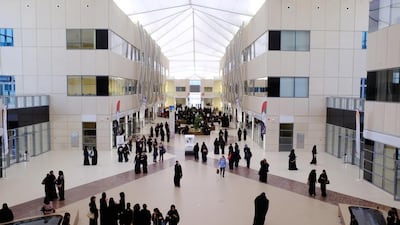DUBAI // Five years ago there were two special-needs students registered at Zayed University. Now, the university has 65 with varying degrees of physical, intellectual and emotional challenges who attend classes and thrive alongside mainstream students.
“We are quite proud of that actually,” said Fatma Al Qassimi, manager of the university’s office of accessibility, which she helped to start in 2010.
“The goal is that we want to graduate special-needs students just like anybody else.”
Mrs Al Qassimi’s work in integrating students and establishing an office to support their needs was presented as a model for others to follow on the final day of the Special Education Needs Access and Engagement Conference hosted by the university and the British Council. The conference attracted about 120 advocates, policymakers and experts to exchange best practices.
“One self initiate decided to make that change, she just tried,” said Alaa Al Harbawi, student affairs specialist at Zayed University, as she presented the university’s path towards inclusion led by Mrs Al Qassimi. “There is no common start-up point in inclusion. You cannot ask yourself, ‘How can I start?’ You just start.”
Although the UAE has had equal access laws in place since 2006, giving special-needs students the right to an education in any mainstream university, the reality is many still refuse to accept such students, said Dr Nadera Al Borno, a researcher and professor at the American University in Dubai (AUD).
“We’re still at a very – we can say – embryonic state, but it’s happening,” said Dr Al Borno, who presented the findings of her study of inclusion in the UAE on Tuesday.
Much of the problem stems from the lack of experience and training among educators to manage, teach and integrate special-education-needs students, she said.
“There is a real need in schools to include the students in the mainstream classrooms,” said Dr Al Borno, who also helped to organise the conference.
“A lot of schools are really accepting it, really taking off with it. Some other schools, because they feel they don’t have the skills, are still afraid of it. The problem is that the private sector is still not jumping into it yet. But the main problem in the UAE is the absence of skilled people like physiotherapists, occupational therapists, speech therapists, skilled shadow teachers, so it’s the support system which is still not there.”
To help meet the growing demand for specialised teachers, AUD will introduce a track in its master of education programme in September that will allow students to focus on special education.
“There are still some barriers, but they are a lot less than before,” Dr Al Borno said. “For the last six years, we have done so really well. A big change. The problem is some of the school principals are still putting up barriers because they say we don’t have skilled people.”
Mrs Al Qassimi, who has had to use a wheelchair since she was a child, also praised the swift changes imposed by the Government in its mission to make the country accessible to all.
“It’s changed a lot actually. Now the country is mostly very well equipped for wheelchair users,” she said. “The buildings, the places I used to go to always had steps, but now it’s changing. Even those old places have now been altered and adapted.”
rpennington@thenational.ae

